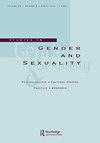Waking Up in Someone Else’s Bed: On Ethos (Bir Başkadır), Netflix, Turkey, 2020
Q3 Social Sciences
引用次数: 1
Abstract
ABSTRACT The Turkish Netflix series Ethos takes a sensitive look at the quagmire that is alterity, both within and outside of psychotherapy. It offers an opportunity to challenge the rigid narratives we use to cope with the unknown and with otherness, as well as problematizing binaries such as religious/secular, primitive/civilized, client/therapist.在别人的床上醒来:论Ethos(Bir Başkadır),Netflix,土耳其,2020
摘要土耳其Netflix电视剧《Ethos》敏感地审视了心理治疗内外的矛盾。它提供了一个机会来挑战我们用来应对未知和另类的僵化叙事,以及宗教/世俗、原始/文明、客户/治疗师等二元对立的问题。
本文章由计算机程序翻译,如有差异,请以英文原文为准。
求助全文
约1分钟内获得全文
求助全文
来源期刊

Studies in Gender and Sexuality
Social Sciences-Gender Studies
CiteScore
0.80
自引率
0.00%
发文量
15
期刊介绍:
Beginning in the final two decades of the 20th century, the study of gender and sexuality has been revived from a variety of directions: the traditions of feminist scholarship, postclassical and postmodern psychoanalytic theory, developmental research, and cultural studies have all contributed to renewed fascination with those powerfully formative aspects of subjectivity that fall within the rubric of "gender" and "sexuality." Clinicians, for their part, have returned to gender and sexuality with heightened sensitivity to the role of these constructs in the treatment situation, including the richly variegated ways in which assumptions about gender and sexuality enter into our understandings of "normality" and "pathology."
 求助内容:
求助内容: 应助结果提醒方式:
应助结果提醒方式:


